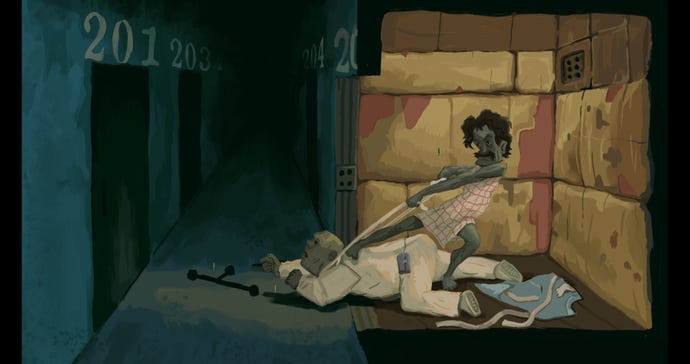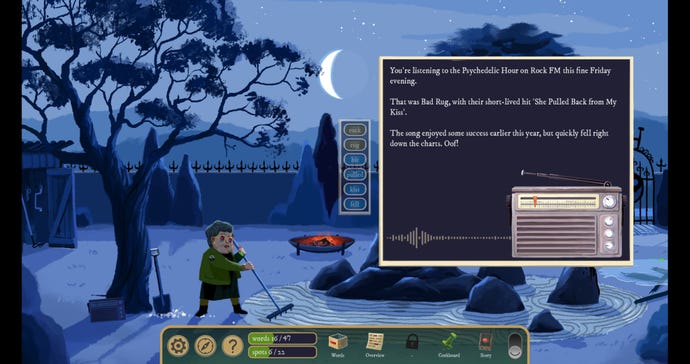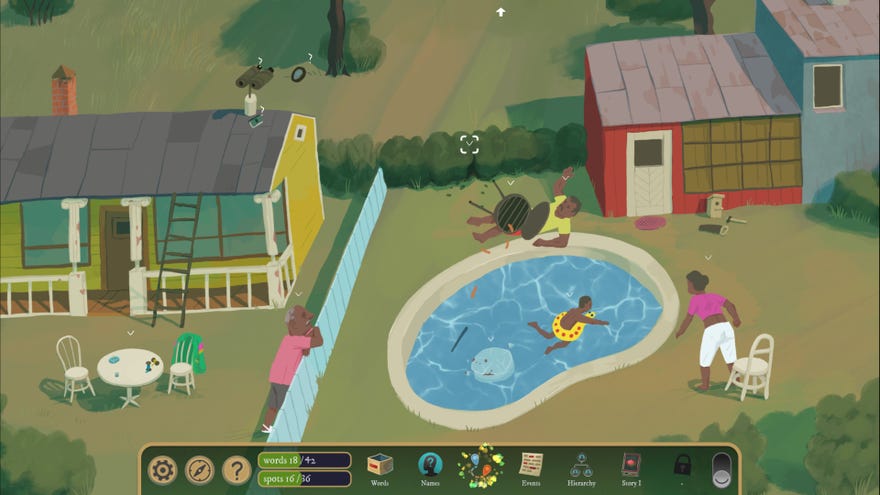Here’s a Steam quote for you: ‘The Rise Of The Golden Idol is the best game I’ve ever played where I spent most of my time staring at the screen going “well what chuffing well is it, then?!” Fiendish but fair, this detective puzzler demands a heady mix of observation, deduction, and logic, but rewards you with a progressively engaging story, and steadily more infuriatingly brilliant puzzles. Despite teaching you everything you need to know in the tutorial, it still manages to introduce new wrinkles and twists on the formula with each fresh chapter. My verdict? Imagine me lying my floor, massaging my temple with one hand and giving a fat thumbs up with the other.
The first scene takes place in a dingy asylum, where we’re shown a nurse desperately crawling toward a truncheon while a patient chokes them with a strap. Later scenes will task us with answering the ‘why’ and more besides, but for now, our job is to divulge the ‘who’, ‘what’, and ‘where’. Certain objects and other points of interest are highlighted, and examining them pours a selection of related words into our word box. Many of these words are useless. Some of them are not. The nurse’s name tag, for example, has his name on it. “Ah” we think. “That’ll be useful for the ‘names’ objective”. We drag his name underneath his portrait, and feel like Dale Cooper doing it.

But what if we’re wrong, eh? We actually won’t know that until we’ve filled out all the names. The game will let us know if we’ve got “two or less” incorrect, but otherwise, it’s a big fat “wrong” symbol, and back to the word box it is. But let’s say we know how name tags work, and we sort them no problem? Then it’s on to ‘events’: “The ‘profession’, ‘name nameson’, killed ‘moniker handle’ with a ‘object’ from a ‘different object’ in the ‘named location”. Drag the right words into the right places and, name’s your relative, you’ve cracked the case. These sort of context hints (‘name’, ‘location’) aren’t on the actual sheet, mind, but the game does give you some help, both through syntax and colour coding certain word categories. Names are always red, for example.
The most important thing the game had to nail, as far as I see it, is not letting what’s effectively multiple-choice detective work become too easy to brute force. One way it achieves this is by simply having too many viable options. Once you get past the tutorial, you’re dealing with half a dozen names minimum, and plenty of points of interest will throw in extra words that are either not needed to solve the case at all, or end up being so contextually specific that you all but need to work out what happened to use them correctly. Alongside these red herring words are full on red-herring stories within the stories you need to solve, bastard subplots specifically engineered to throw you off the scent.
The reason these flubplots work so well at distracting you is that, like everything in Golden Idol, they’re all grounded within their own individual snippets of a larger story. Each scene spells out not only the crime, conspiracy, or other incident, but the moments and sometimes days leading up to it. Early on, I found myself getting stumped because I’d developed tunnel vision for just the points of interest. But what the game really wants you to do is take in the scene as a whole, including parts that aren’t necessarily highlighted. A scrap of cloth. An open window. What individuals are wearing. You might not be able to inspect these things to add extra words to your collection, but they’re still crucial in eventually putting all the pieces together.
Each scene tells its own story, of course, but I think it was around chapter three where I started wanting to solve individual scenes not just for their own satisfaction, but because I was becoming invested in the larger mystery. The story skips back and forth through time, at some point showing recurring characters at different point in their lives. It’s supremely satisfying to start drawing connections based not only on what’s in front of you, but through context you’ve previously picked up on from the larger unfolding mystery.

And this is what makes The Rise Of The Golden Idol truly special, I think – the way it draws out so much character and flavour from such a straightforward means of interactivity. You can go about sleuthing safe in the knowledge that you have all the tools to solve a scene, but still don’t feel constrained or railroaded. It’s a wonderful example of a stripped back design pitch in one area – “fill in the blanks” – allowing for an incredible amount of variety and creativity in others.
I do have a few complaints, but they’re basically just ease-of-use features I’d have liked to see. You’ll want to cross-reference a lot of information, and so have multiple windows open at the same time. But I couldn’t find an option to resize them, resulting in a lot of screen clutter. At the end of each chapter, you’ll fill in another timeline of events, but still have to revisit scenes you’ve already played to remind yourself of crucial information – more detailed summaries on these that you can access from the scene select menu, where you’ll perform this, would have been ideal.
That said, the most important accessibility feature – at least mainlining it as a reviewer who hadn’t played the previous game – was tuned just how it needed to be. I used hints a lot, and not once did they strip away the sense of fun or mystery, with even the biggest ones still leaving me a lot to chew on. All said, I really don’t have anything too profound or insightful to say about this one. Rise Of The Golden Idol is a moreish, satisfying, occasionally brain-malfunctioning mystery that’s polite enough to match every time it makes you feel like a complete idiot, with another instance of making you feel like a genius.
















